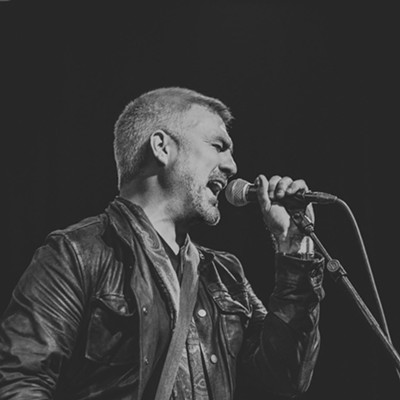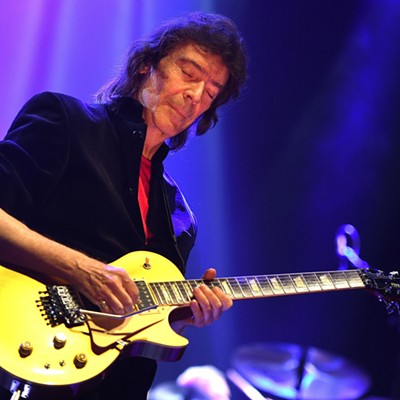When, in disgrace with fortune and men's eyes,
I all alone beweep my outcast state
And trouble deaf heaven with my bootless cries ...
George Clarke and Kerry McCoy did not have those lines from William Shakespeare's "Sonnet 29" in mind when they named their band Deafheaven, but Clarke isn't opposed to the allusion.
"I don't know if that sonnet was in the back of my subconscious or it's just a coincidence, but I just came up with the name out of the blue," Clarke says by phone during a recent interview. "I don't mind the reference, though."
Deafheaven will play its first gig in Tucson this Friday at 191 Toole, the all-ages downtown concert venue formerly known as Skrappy's. The bill also will include Destruction Unit, from Phoenix, and the Tucson bands Sex Prisoner and North.
Formed about four years ago in San Francisco, Deafheaven is a collaboration between vocalist Clarke and guitarist McCoy, who have been friends for more than 11 years and used to play together in the grindcore band Rise of Caligula.
The band plays an arresting form of black metal that is heavily influenced by the introspection of shoegaze, the Zen-like focus of ambient music and the minimalist patterns of post-rock. The result is a beautiful combination of contraction and release, vulnerable and violent at the same time, like a birth or the blossoming of a flower. The long-form songs—usually ranging in length from six to 15 minutes—feature tsunamis of guitar, clouds of distorted noise, jackhammer rhythms and blast beats, and Clarke's agonized shrieks.
On their latest album, Sunbather, which was widely praised as one of 2013's best releases, Deafheaven also includes shorter songs between the epics. These bits of melodic tenderness serve the role of raw, pickled ginger during a meal of sushi: They help cleanse your palate between courses.
Clarke says there's a clear purpose in Deafheaven's use of longer song formats.
"We did that purposely to allow the musical ideas to come through and develop in a very clear way to showcase what we hope are unique chord progressions and key changes, and to build dramatically to the final moments. Some bands do a good job with short, sharp bursts of ideas. That's not how we do it. For us, it's important to travel through all the layers in order to convey our meaning."
And on Sunbather, that meaning addresses what publicity information calls "the profound sadness found in the quest for one's personal perfection."
Clarke clarifies, saying the new album is about ambition, expectation and disappointment.
"I think a lot of people have a personal ideal of where they want to be at a certain age in life. You know, 'At 25 I want to be here, and at 35 I want to be there and have accomplished this,' and on. And not all the things that you expected to happen in life do happen, or other things happen that you never expected. And at a certain point you realize this, and how you are living in a different reality than you ever thought you would. It's about the realization that your life is not what you could have imagined."
Some listeners might not be able to immediately discern such meaning from Clarke's high-pitched, rasping howls. Clarke says this is simply the brush with which he chooses to paint.
"With the metal elements we incorporate into the music, that vocal style, I think, just complements best the music being played. It's got the intensity and tension that I think illustrates the intentions of the songs."
He says he hasn't employed a vocal coach, nor does he have a particular health regimen for taking care of his voice. "We've just done so much touring, and I guess you would say I have trained myself—I know how to control my voice and make it work this way, and I know how to do it without hurting myself."
Clarke's vocals probably are the most typically black-metal element of Deafheaven's music. In most ways, the group is far from your traditional extreme-metal band. And they have, in fact, heard the criticism from some camps that they are "not metal enough."
Not that they ever intended to be. "You're always going to have criticism, no matter what you're doing, especially if you don't conform to a standard," Clarke says. "It doesn't matter to me. We are trying to do what we are doing to the best extent that we can. The most important thing is to stay honest to ourselves and to love what we do."
Clarke says he and McCoy listen to all kinds of music, including R&B, hip-hop and radio-friendly pop, and they understand that the music world changes all the time. Including the world of metal.
Although they embrace that change, Deafheaven are not trying to reinvent the wheel. "We are not trying to find a new, unique sound. We are just trying to find our sound, and if we are lucky, it will be a new sound."
Both of Deafheaven's full-length albums were released by the independent label Deathwish, which was founded by Converge vocalist Jacob Brannon.
And, staying true to the indie spirit, Clarke recently formed his own imprint, All Black Recording Co., with his friend and former Deafheaven bassist, Derek Prine. Its first release will be the debut album by the Oakland, Calif., band Black Monolith in April.
Although Deafheaven is essentially a duo, they use other players to fill out their live personnel. The group is currently touring as a quintet that includes drummer Daniel Tracy (who also played on Sunbather), bassist Stephen Clark and guitarist Shiv Mehra.
The band is already planning its next album, and although he and McCoy compose the music and lyrics, Clarke expects other musicians to participate in the new recording.
"We are hoping it will have that immediacy and intensity of a whole band, and that it won't be up to just Kerry and I. We'll delegate some more of the roles."







